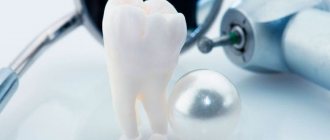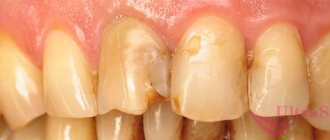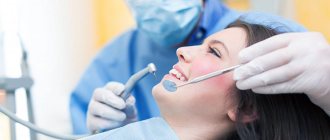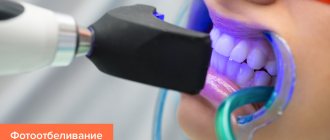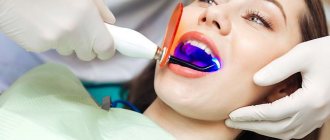Author of the article:
Soldatova Lyudmila Nikolaevna
Candidate of Medical Sciences, Professor of the Department of Clinical Dentistry of the St. Petersburg Medical and Social Institute, Chief Physician of the Alfa-Dent Dental Clinic, St. Petersburg
Teeth whitening is usually contraindicated for pregnant women, this applies to both professional methods and home procedures. It is best to wait until the birth of the child, since whitening is a serious dental procedure based on oxidative processes; the lightening of the enamel is a consequence of the effect of atomic oxygen on its surface. In order to activate the reaction, special compounds are exposed to lasers, lamps, etc.
Dentists say there are ways to safely whiten teeth during pregnancy. So, if you are impatient, you can use this option. We suggest you look into the issue in more detail, find out why bleaching is harmful, what methods are available and what can reduce the negative consequences.
Early and late dental treatment
Pregnancy is a difficult and very important period for a woman’s health. And very often, thinking about the unborn child, the mother forgets about herself, in particular about the health of her teeth. Against the background of hormonal changes and changes in the immune system during pregnancy, many chronic diseases can worsen, including diseases of the teeth or oral mucosa.
And the development of infection can lead to the entry of dangerous bacteria into the blood, which complicate the course of pregnancy and can harm the body of the expectant mother and her baby. This poses a particular danger during the period when the placental barrier is not yet fully formed, i.e. in the first weeks of the gestation period. Therefore, it is absolutely necessary to treat your teeth during pregnancy! But on the other hand, treatment often uses strong anesthetics and antibiotics, so the dentist has to carefully balance the therapeutic effect of the chosen drug with its risk to the child.
What to do to avoid problems?
We would like to remind you once again that in order to avoid the need for dental treatment during pregnancy, which is a potentially dangerous situation during this period (or at least reduce the likelihood of dental problems), it is very important to perform a complete sanitation of the oral cavity in preparation for pregnancy. this important stage, in advance.
And after conception, carefully observe the hygiene of your teeth and the entire oral cavity: brush your teeth promptly and carefully, using toothpastes and rinses approved during pregnancy, reduce the amount of food that is dangerous to your teeth, chew more carefully, consult with your doctor about what vitamins to take to avoid calcium deficiency, destructive to teeth.
Procedures that are acceptable during this period
Unfortunately, not everything can be foreseen and not prepared for everything in advance. Therefore, at the first sign of dental problems, you should consult a doctor without waiting for acute pain to occur, because both the developing infection and the pain itself are very dangerous for the health of the unborn child.
If necessary, the following procedures can be carried out:
- treatment of diseases such as caries, periodontitis, pulpitis, periodontitis – i.e. all those that are associated with the emergence and development of a source of infection, with the risk of dangerous microorganisms and toxins entering the blood; of course, depulpation should be carried out without the use of arsenic,
- removal of a tooth that cannot be treated (for example, it is severely destroyed, or the root has been damaged, an area of inflammation or a large cyst has appeared), or is in severe pain,
- perform prosthetics - only when it is required for normal nutrition of the mother and the inability to postpone the procedure,
- professional teeth cleaning, tartar removal, etc.
But such manipulations as removal of wisdom teeth, correction of bite defects, implantation, surgical operations and other similar procedures are best postponed until later. In general, it is necessary to take into account that, if possible, it is better not to carry out any dental treatment at all during pregnancy in the early stages (in the first trimester), until the fetus and placenta are fully formed. The second and third trimesters are more suitable.
1st trimester of pregnancy
The entire period of pregnancy is traditionally divided into three parts (trimesters), according to the main stages of development of the unborn child. The first trimester is the most crucial; it is at this stage that the fertilized egg is implanted, the placenta and embryonic organs are gradually formed, so any medical interventions, incl. Dental treatment in the first trimester of pregnancy carries serious risks.
In the first trimester (up to 12 weeks) planned sanitation is not indicated, help is only for acute pain, because the unborn child is developing organs, the placenta is not yet developed (i.e. there is no proper protection of the fetus from negative factors), the woman often experiences toxicosis , at 8-9 weeks there is a danger of spontaneous abortion. Remineralizing therapy and professional teeth cleaning, removal of hard deposits, and oral hygiene without the use of ultrasound are allowed.
2nd trimester of pregnancy
In the second trimester (from 13 to 24 weeks), treatment of oral diseases is considered safer. The placenta already reliably protects the child, toxicosis and the risks of abortion are behind us, the woman can remain in the dental chair for a long time. The following manipulations can be performed: professional cleaning of hard and soft dental plaque, treatment of caries and its complications.
Most doctors agree that the second trimester for dental treatment during pregnancy is the most relatively safe period. Nevertheless, you need to pay the most serious attention to the choice of medications and painkillers. Lidocaine and novocaine are extremely undesirable.
Treatment in the 3rd trimester
In the third trimester (from 25 weeks until childbirth), dental care is provided only according to strict indications (if the woman’s general condition may worsen). By the end of pregnancy, many women experience shortness of breath, tachycardia, and decreased blood pressure; when reclining in a chair, such phenomena can cause significant discomfort and even lead to a worsening of the condition (the uterus compresses the inferior complete vein).
During this period, the body is more sensitive to medications, the woman becomes anxious and cannot stay in the dental chair for a long time. So dental treatment during pregnancy in the 3rd trimester is possible only up to 34 weeks. At 36-37 weeks, only emergency intervention is performed, because... during this period, treatment can provoke premature birth.
Clinical researches
Clinical studies have proven that regular use of professional toothpaste ASEPTA GENTLE WHITENING for a month allows you to lighten tooth enamel by 1.5 tones, increases anti-caries effectiveness by 3.4 times and increases enamel remineralization by 2.6 times.
Sources:
- Report on determining/confirming the preventive properties of toothpaste “ASEPTA PLUS” GENTLE WHITENING” Author: doctor-researcher A.A. Leontyev, head Department of Preventive Dentistry, Doctor of Medical Sciences, Professor S.B. Ulitovsky First St. Petersburg State Medical University named after. acad. I.P. Pavlova, Department of Preventive Dentistry
- Report on the determination/confirmation of the preventive properties of personal oral hygiene products “ASEPTA PLUS” Remineralization doctor-researcher A.A. Leontyev, head Department of Preventive Dentistry, Doctor of Medical Sciences, Professor S.B. Ulitovsky First St. Petersburg State Medical University named after. acad. I.P. Pavlova, Department of Preventive Dentistry
- Clinical studies of antisensitive toothpaste “Asepta Sensitive” (A.A. Leontyev, O.V. Kalinina, S.B. Ulitovsky) A.A. LEONTIEV, dentist O.V. KALININA, dentist S.B. ULITOVSKY, Doctor of Medical Sciences, Prof. Department of Therapeutic Dentistry, St. Petersburg State Medical University named after. acad. I.P. Pavlova
- Report on determining/confirming the preventive properties of toothpaste “ASEPTA PLUS” COFFEE and TOBACCO Author: doctor-researcher A.A. Leontyev, head Department of Preventive Dentistry, Doctor of Medical Sciences, Professor S.B. Ulitovsky. First St. Petersburg State Medical University named after. acad. I.P. Pavlova, Department of Preventive Dentistry
Safe anesthesia options for pregnant women
Dental treatment under anesthesia during pregnancy is clearly prohibited - only local painkillers can be used. However, local anesthesia for dental treatment during pregnancy is very important: severe pain during treatment can cause a surge of adrenaline, which can dangerously affect the unborn baby and even cause premature birth.
Novocaine and lidocaine should be excluded from local anesthetics - they can cause muscle weakness, cramps, pressure changes, dizziness and vomiting. Ubistezin, ultracaine, artifrin, alfacaine are considered safer painkillers for dental treatment during pregnancy, because they do not have a vasoconstrictor effect and almost do not penetrate the placenta.
How to reduce harmful effects
A dazzling smile does not mean that your teeth are completely healthy. Behind the thin enamel is dentin. It is a structure with yellowish or grayish pigmentation. Whitening uses active chemical compounds that lead to thinning of the enamel layer or damage to its integrity. This also affects the condition of the oral cavity.
To minimize negative consequences, the dentist performs the following actions:
- Conducts a visual inspection and assessment of the condition of hard and soft tissues in the mouth.
- Identifies possible contraindications.
- Selects a safe and effective method of teeth whitening.
- Uses any available methods to diagnose and relieve pathological processes.
Tooth extraction during pregnancy
It is not advisable to undergo tooth extraction during pregnancy. This is always associated with a heavy burden, both psychological and emotional, as well as physiological - after all, this is a surgical operation. In addition, with such an operation there is a high probability of infection and the development of inflammation, which may require the use of antibiotics, the use of which is extremely undesirable during pregnancy.
Therefore, planned extractions (for example, wisdom teeth) are not carried out during this period, and only emergency extractions are performed, associated with severe acute pain, dangerous inflammatory processes, fracture of the root or neck of the tooth, the formation of a large cyst (more than 1 cm) or a purulent focus of inflammation.
Is it possible to take an X-ray of a tooth?
A lot of questions arise about whether it is possible to take dental x-rays during pregnancy. In the first trimester, X-rays are prohibited. Dental X-rays in the early stages of pregnancy pose a high risk of dangerous effects on the woman’s body and the developing fetus. In the second and third trimester, x-rays can be taken (preferably radiovisiography, characterized by lower radiation intensity) using a protective apron and according to strict indications.
Is it possible to do x-rays?
It is not advisable for pregnant women to undergo X-rays, and it is strictly contraindicated in the first trimester. But at a later date, if there is evidence, such a procedure is possible. Fortunately, modern dentistry uses equipment with highly sensitive sensors and minimal radiation. During the examination, the patient’s chest and abdomen are covered with a lead apron.
Attention!
To avoid the risk of complications in the fetus, it is worth taking care of prevention at the stage of pregnancy planning. Before deciding to expand the family, a woman needs to consult a dentist, cure all carious lesions, chronic diseases of the gums and periodontal tissues, and, if necessary, undergo procedures to strengthen tooth enamel. Those who are preparing to become a mother need to pay special attention to hygiene and proper oral care, because during pregnancy the risk of developing caries increases.
Implantation and prosthetics during pregnancy
Prosthetics in themselves are not prohibited during pregnancy. You can install removable and fixed dentures, and even crowns. But implantation will have to wait until the baby is born. Dental implantation during pregnancy requires a huge expenditure of vitality and body resources, and most importantly, the use of anti-inflammatory drugs, strong painkillers, and sometimes antibiotics.
Inserting an implant into bone tissue requires surgical cutting of the gum and drilling into the bone. And then the body must form new bone tissue around the implant. And all this during the period when the skeleton of the unborn child is intensively formed, when every milligram of calcium counts - so much so that the mother’s body is ready to weaken its own bone tissue and the structure of the enamel and dentin of the teeth so that the baby’s body does not experience a lack of calcium.
Therefore, during such a period, it is extremely unwise to further weaken the mother’s body and endanger the unborn child through the most complex surgical implantation operation. It is better to wait a few months and have implantation done after birth, without endangering the baby.
When is whitening needed?
Different people have different shades of enamel. This is due to genetics, lifestyle, and the quality of hygiene procedures. Changing the color of teeth can have several reasons:
- insufficient oral care;
- artificial or natural colors contained in food;
- bad habits;
- jaw injuries, some systemic diseases;
- taking medications;
- age-related changes.
If any of these reasons are present in your life, or you simply want to lighten your enamel a few shades to make your smile look healthier and more beautiful, this is an indication for whitening.
How often do you need to perform the whitening procedure to maintain the effect?
Teeth whitening using chemicals changes the condition of the enamel. Therefore, doctors do not recommend performing it more often than once every 2 years. Between procedures it is recommended:
- For the first month, avoid food and drinks with active dyes - red wine, coffee, brightly colored vegetables.
- Quit smoking - nicotine will quickly return the yellowish tint.
- Visit your doctor regularly to get rid of plaque and tartar.
- Use threads, special pastes, and electric brushes in home care.
